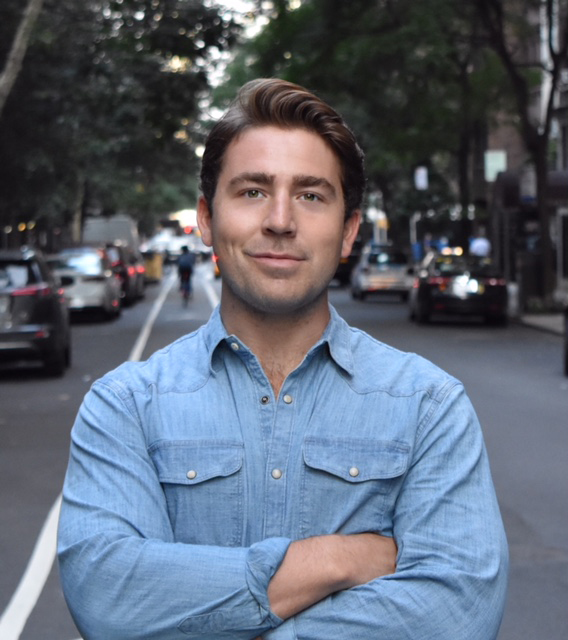
Alum named to Forbes 30 Under 30 list
Friday, January 20, 2023
Cooper Jones followed in his family footsteps when he made his way to Stillwater after growing up in Chicago. His grandparents, aunts and uncles, parents and older sister all graduated from Oklahoma State University, so there was little doubt where Jones would end up.
Recently, the 29-year-old OSU graduate (bachelor’s degree in finance, 2015) was recognized in the Forbes 30 Under 30, a set of lists of people under 30 years old issued annually by the magazine. Jones was one of 30 honorees in the education category for 2023.
 Jones caught the eye of Forbes editors as the co-founder and CEO of Rah Rah, an app that centralizes maps, schedules
and all of the information that students need when they arrive on a college campus.
Since launching in 2018, Rah Rah has raised $4.8 million and has partnered with schools
in the Big 12, Southeastern Conference, Big Ten and some private liberal arts colleges.
Jones caught the eye of Forbes editors as the co-founder and CEO of Rah Rah, an app that centralizes maps, schedules
and all of the information that students need when they arrive on a college campus.
Since launching in 2018, Rah Rah has raised $4.8 million and has partnered with schools
in the Big 12, Southeastern Conference, Big Ten and some private liberal arts colleges.
What does it mean to you to be selected as one of the Forbes 30 Under 30 honorees?
There’s actually a funny story when it comes to this. I found out a little earlier
than most other honorees that I was selected and the reason behind that was I contacted
the editor to ask to be removed from consideration. I’m not very comfortable with
accolades such as this, and more so prefer to focus on the work. The editor told me
that I had “made the cut” and convinced me to change my mind and remain on the list.
Which, I’m glad I did because it brought a lot of exposure to what we are working
on. A lot of people assume that making this list is a validation or confirmation of
success, when in reality it’s an acknowledgement of hard work. Not just mine either
but my teammates as well. That work isn’t over. So, while it was fun to see my family
and friends’ responses, it didn’t change too much. We have a long way to go but we
are motivated to progress on our mission every day.
What is Rah Rah and how did you come up with the idea for the app?
Rah Rah is an enterprise mobile application that puts the entire student experience
into one consumer-like platform. It distills a student’s day-to-day wants and needs
into a simple and scaleable app. It also integrates with many existing systems that
a campus leverages to provide a single pane of glass for a student to look through
for whatever they need. Lastly, it leverages artificial intelligence to ensure that
each student has a relevant, timely and expedited experience when it comes to their
life on campus. It turns out that taking a student centric approach in our development
not only addresses many of the challenges higher education faces today but is now
also being leveraged for employee engagement, student recruitment and alumni engagement.
I actually have to give some credit to my experience at OSU. As I mentioned before, my entire family graduated from OSU, so it was inevitable that I would enroll as well. That being said, I was still a kid from Chicago that didn’t know anything about or anyone at OSU. I didn’t even have a pair of boots yet! Despite this unfamiliarity, I was privileged to have my sister who was a senior when I was a first year on campus. Day one she was able to tell me where this was, what I would be interested in, who I need to talk to, how this works, etc.
The unfortunate reality is that, this is a privilege. A vast majority of college students in America are first generation and they are arriving on a campus and seeing an extremely complex, new environment. We realized that we could solve this problem with modern technology. After further exploration we realized how disparate, outdated and siloed the student experience was from a technology and “user” experience perspective. Students today don’t want workflows, they want (and expect) a consumer like experience. We saw an opportunity to make an impact by building a piece of technology that would address challenges higher education faces while also providing students with a mobile solution that they would actually want to use.
What are your dreams for Rah Rah?
-
Build a great company that people love working at and for. A lot of companies will prioritize their customers first, but we like to prioritize our team. We believe if our team is happy, motivated and fulfilled then that will pour over to those that we serve. Legacy is a strong word but if I can look up and say we did the right thing for all of the folks that came (and went, it happens) then I’ll be happy.
-
Make an impact. I’m thankful that we provide a tool that actually makes an impact. It is very easy to wake up every morning knowing that we are helping our users and customers with things such as mental health, graduation rates, student success, equitability, diversity and so much more. I find that a lot more motivating than say, building some sort of workflow automation tool. Our goal is to make this impact as demonstrable as possible.
-
Sustainability as a brand, product and company. I believe many founders get distracted by what comes after growth, success and impact, as if it is a finish line ultimately completed by selling a business or some other exit. We at Rah Rah interpret these areas or phases as a journey that essentially never ends. Keeps us humble, keeps us motivated and it keeps our customers and users happy.
How did Spears Business impact you while in college and now that you are in the business
world?
There are so many different ways but what automatically came to mind was my friendship
with Dean Eastman. His willingness to meet with and hear me out on different topics,
issues or opportunities was truly astounding and so appreciated. He even helped me
early on with Rah Rah by telling me what I was right and wrong about or what I was
missing. Next to that I would say just the opportunities or exposure that was presented
to us as students. Having the opportunity to receive mentorship from executives and
listen to discussions led by folks from many different industries helped mold me into
the professional that I am today. Not to bring it back to Rah Rah (sorry I’m a biased
founder) but it’s another reason we started this business. If the awareness of opportunities
like this and across campus we are actually reaching every student, in their hand
with an experience they expect versus a flyer on a board or one of 100 daily emails,
a lot of good would come from it.
What are your fondest memories of OSU?
For many students, their freshman year is the hardest. Fortunately, it was the opposite
for me. That year was incredible because my sister was on campus at the same time.
The amount of time that she, my parents and extended family members gathered around
a table at Hideaway or at a tailgate is something I’ll always look fondly upon. It
was also the best grades I ever had. I blame the downslope in performance on the Strip!
What advice would you give to current business students?
Dream BIG. You’re so young with your entire life in front of you so now is the time
to take risks, be bold and dream big. The only people that will actually care if you
fail are those that don’t matter. The people that matter most in your life are going
to support you every day. Failure isn’t a bad thing, it hardens us and brings growth.
Secondly, live a balanced life of hard work and fun. Life is hard, there's no other
way around it - the world keeps turning no matter what, so I believe it's important
to acknowledge the seriousness of this and the inevitable challenges that arise. Acknowledge
and employ a lesson we’ve all been told, “hard work pays off.” If it was easy everyone
would do it. Then be sure to balance this with grace, joy, camaraderie and fun.
What advice would you give to those who are contemplating creating a startup business?
Be vulnerable. Have a willingness to 1, put yourself out there and 2, be ok with someone
disagreeing with you whether it’s an opinion, an idea, a business. I probably had
100 different people tell me that Rah Rah was a bad idea and each time, rather than
being defensive or ignorant, I listened. I learned and I was able to take all of that
feedback to further refine what was just a business plan on a Word doc into what we
do today. That wouldn’t have happened if I didn't get out of my comfort zone.
